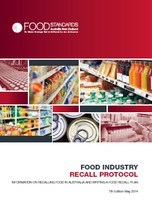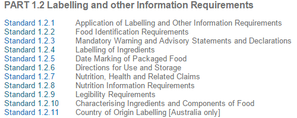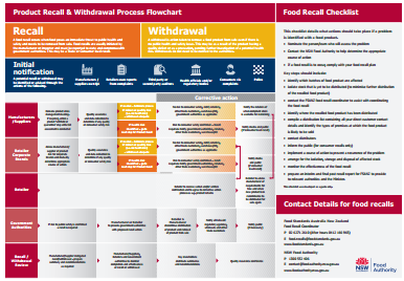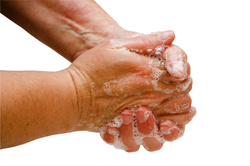This is updated regularly at http://www.afgc.org.au/publications/
This is the form as at January 2016 (Click Here)
| ✓ Correct Training Systems |
|
|
This AFGC is used to notify major Australian Retailers in the event of a recall.
This is updated regularly at http://www.afgc.org.au/publications/ This is the form as at January 2016 (Click Here) FSANZ maintains a current list of Food Recall action officers.
In the event of a possible recall seek advice from a recall action officer from the food enforcement agency in the state/territory where your head office is located. These officers can assist with determining if a recall is necessary and what type of recall (consumer or trade) Click here for a list of state and territory food recall action officers  Information on recalling food in Australia and writing a recall plan. 7th Edition May 2014. Published by FSANZ. The Food Industry Recall Protocol (Protocol) provides information on recalling food in Australia and guidance for food businesses on developing a written food recall plan. This Protocol provides guidance and is not legally binding; however it outlines legal requirements relating to food recalls that are enforceable by the state and territory governments. (Click here)  Use this link (Click here) to access the FSANX Food Standards Code on Labelling. Chapter 1 General Food Standards Part 1.2 Labelling and other information Requirements Very simple checklist for labelling compliance by NSWFA. This aligns to the FSANZ labelling standard code.
Click here HACCP is a system which identifies, evaluates, and controls hazards which are significant for food safety. First adopted in 1969. Amendment 1999. Revisions 1997 and 2003.
This document sets out the principles and Guidelines of the Hazard Analysis and Critical Control Point (HACCP) system adopted by the Codex Alimentarius Commission. The Principles of the HACCP System set the basis for the requirements for the application of HACCP, while the Guidelines for the Application provide general guidance for practical application. 12 steps of HACCP and the CCP decision tree is in the annex of this document. Download the 2003 Codex HACCP CAC/RCP 1-1969, Rev. 4-2003 - Annex here_. Here are some documents that are widely used in the HACCP plan or HACCP study when developing a HACCP Food Safety Plan.
1. WRAC table for HACCP hazard analysis 2. CCP decision tree Download these resources here.
Businesses that manufacture or wholesale food in NSW fall under the NSW Food Authority’s Manufacturer/Wholesaler Food Inspection Program and are required to have inspections. These inspections will be unannounced visits. This NSW Food Authority fact sheet outlines what wil be expected and inspected at a food processing, importing or wholesaling business.
( click here )
 Under the Food Standards Code, a food handler must take all reasonable measures not to handle food or food surfaces in a way that is likely to compromise the safety and suitability of food and protect food from contamination. Food handlers also have specific responsibilities relating to health and hygiene. This NSW Food Authority fact sheet outline the Health and Hygiene responsibilities. (click here) The Department of Health & Human Services has launched a new template supplement, for class 2 retail and food business who use Sous Vide practices as a method of cooking or cook chill high risk food. Food safety program template Supplementary practices section. Sous Vide. This supplement is for use with the Food Safety Program template for class 2 retail and food service businesses, No.1 version 3. The supplement outlines the requirements, and time and temperature parameters for businesses using sous vide cooking practices. This supplement template informs industry standards for Sous Vide Cooking processes and controls. This document is required reading for the CTS Audit a Cook Chill Process training program.
The Food Regulation 2015 (NSW) requires certain food businesses in the NSW hospitality and retail food service sector to have at least one trained Food Safety Supervisor (FSS).
The NSW Food Authority manages the certification of Food Safety Supervisors. All information regarding gaining a Food Safety Supervisor is available on the NSW Food Authority website (click here). Businesses in other states approved by NSW Food Authority as a Registered Training Organisation to deliver, assess this qualification. The NSW Food Authority has “General Guidelines for the Development and Implementation of a Food Safety Program”, “Food Safety Program Template” as guidance documents. un licenced businesses. This template is based on the principles of HACCP, but does not meet all requirements for a certified HACCP food safety program. It is not suitable for NSW Food Authority licenced business.
If using these document to develop your Food Safety Program then you must adapt these to fit your business, products,compliance and and market requirements, and to ensure that all potential food safety hazards are correctly identified and appropriately controlled.You are advised to seek independent professional advice in relation to any query you may have regarding the legal obligations and regulatory compliance requirements. Food manufacturers and importers must have procedures in place for the recall and withdrawal of unsafe or unsuitable food. Retailers must remove recalled food from sale.
This is a simple factsheet outling responsibilities for recalls and withdrawals. (Click here) The Food Standards Code allows food businesses to hold food between 5°C and 60°C for short, measured periods of time. The time for which food can be safely held between 5°C and 60°C is commonly referred to as the ‘4-hour/2-hour rule’.
The NSW Food Authority has a guideline on how businesses should apply this 2- 4 hour rule. (Click here ). This should inform or assist the food safety supervisor, HACCP team leaders or others responsible for implementing a workplace food safety program. The NSW FA has a brief video on the responsibilities of retail and food service businesses. This is ideal to show your staff as part of induction training.
(Click here)
 NSW Food Authority has a useful flowchart to use to determine withdrawal or recall action. (Click here) The NSW Food Authority (the Food Authority) has prepared the NSW Food Safety Schemes Manual (the Manual) to specify certain requirements for the following Food Safety Schemes under the Food Regulation 2015: This outline the tests and frequency for NSW business that fall under
Dairy food safety scheme, Meat food safety scheme, Plant products food safety scheme, Seafood safety scheme , Vulnerable persons food safety scheme , Egg food safety scheme. (Click here)  Handwashing is the most critical action to avoid cross contamination within a food business. Proper hand washing at the right times helps to prevent microorganisms spreading to food. Print this NSW Food Authority guide off to give to you staff, at induction or as part of regular food safety and hygiene training. ( click here ) All food labels must conform to the Australia New Zealand Food Standards Code.
The NSW Food Authority has a useful resource on the labelling requirements for packaged foods. (click here) |
Categories/
|
||||||||||||||
Correct Food Systems-
|
|